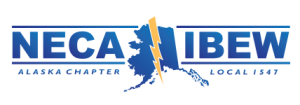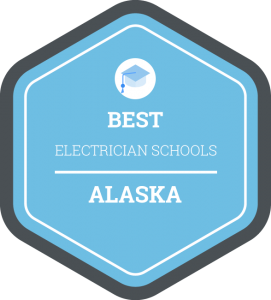This page compiles information about the top electrician schools in Alaska.
Programs are designed to combine classroom education with practical hands-on training to prepare students for entry-level employment in the field.
This profession can be learned in high school, if related classes or dual enrollment programs are available or after graduation at a community college or trade school.
Apprenticeships are also available and allow students to learn through a mix of paid on-the-job training and classroom instruction.
We invite you to read further and decide what program works best for you.
1Northern Industrial Training

About the School
Northern Industrial Training provides training programs for students who want to start careers in skilled trades.
Programs are available for adults and high school students.
Continuing education programs are also offered at the school for experienced workers who want to keep up with the latest advancements in the field.
The school has campuses in Palmer, Anchorage, and Jber.
Courses Offered
The high school division includes an Electrical pathway.
This program focuses on building entry-level skills in electrical systems.
Students learn through a combination of theory-based learning and demonstrations using real-world examples.
The program has two eight-week levels.
Tuition cost is $450 per level.
Additional one-time costs are $250 and include books and materials fees.
The following vocational programs are also available at Northern Industrial Training:
- Construction Equipment
- Safety- classes that cover light equipment, first aid, fall protection, OSHA, and more
- Mechanic Programs
- Pro Truck Driving
- Project Management
- Welding Programs
Preparatory courses are also available in the NCCER core curriculum, welding, and other fields.
Workshops that cover the basic skills taught in traditional programs are also available.
Contact Information
- Address: 1740 N. Terrilou Ct. Palmer, AK 99645
- Phone: 907.357.6400
- Website: https://nitalaska.com
2NECA IBEW Alaska Chapter

About the School
NECA IBEW Alaska Chapter is a partnership between The Alaska Chapter of the National Electrical Contractors Association and The International Brotherhood of Electrical Workers Local 1547.
Apprenticeships and journeymen classes are available in Anchorage and Fairbanks.
Online courses are also offered.
Courses Offered
Training is available for the following job classifications:
- Wiremen- a program for those who want to start a career as an inside wireman in industrial, commercial, and private structure and installation
- Linemen- this program prepares students for careers as outside linemen responsible for the distribution and transmission of high voltage power form from the generation point to the building.
- Telecom- this program prepares communication workers that install equipment in line construction, splicing, installation and repair, central offices, or customer-owned equipment.
Classes take place eight hours a day, five days per week.
Students attend school for eight weeks at the beginning of the program.
Three additional eight-week sessions will be completed as they participate in the on-the-job training part.
Apprentices earn a wage that starts at 50 percent of the journeyman wage.
After every 1,000 hours of on-the-job training completed, apprentices earn a 5 percent raise.
Contact Information
- Address: 5800 B. Street, Anchorage, AK 99518 (Main Office)
- Phone: (907) 337-9508
- Website: https://alaskaelectricalapprenticeship.org
3Alaska Works Partnership

About the School
Alaska Works Partnership provides construction education and training.
This non-profit organization gives Alaskans access to jobs in the construction industry.
Apprenticeship and pre-apprenticeship programs are available to help students learn the skills needed for employment in the construction trade.
These programs combine on-the-job training with formal classroom and hands-on instruction.
Apprentices earn a wage while they learn the skills needed for this profession.
Their programs are funded by grants offered by the U.S. Department of Labor’s Employment and Training Administration, and the Alaska Department of Labor and Workforce Development.
Courses Offered
Pre-apprenticeship programs are available in a variety of fields, including Electrical Wiremen, Building Maintenance, and more.
Trade-ready classes are also available in Trades Math, Blueprint Reading, Trade Apprenticeship Interview Skills, OSHA 10 Construction, OSHA Fall Protection, and more.
Apprenticeships are also available in a wide range of building trade specialties, including, Electrical Wiremen.
Contact Information
- Address: 161 Klevin St. Suites 203, 204 & 207, Anchorage, Alaska 99508
- Phone: (907) 569-4711
- Website: https://www.alaskaworks.org
4Mat-Su College

About the School
Mat-Su College offers academic programs that cover a wide range of topics.
Resident tuition is $234 per credit hour for undergraduate: preparatory and lower-division programs.
Undergraduate tuition for upper-division programs is $282 per credit hour for resident students.
Mat-Su College is accredited by the University of Alaska Anchorage and the Northwest Commission on Colleges and Universities.
Courses Offered
The college’s catalog includes a Refrigeration and Heating program.
This program prepares students for the Environmental Protection Agency Section 608 National Certification Exam and the ESCO Institute Employment Ready certification exam.
The programs help students understand complex systems through class work and hands-on experience.
This program covers Electrical Circuits for Refrigeration and Heating and many other topics, such as:
- Fundamentals of Heating
- HVAC/R Distribution Systems
- HVAC/R Control Systems
- And more
Students need at least 24 credits for this degree.
Contact Information
- Address: 8295 E. College Drive, Palmer, AK 99645
- Phone: (907) 745-9774
- Website: https://matsu.alaska.edu
5Alaska Construction Academies

About the School
Alaska Construction Academy places high school students and adults into apprenticeship programs in high-demand professions in construction and skill trades.
The academy was created in 2006 in conjunction with industry professionals, local school districts, and adult education providers.
Courses Offered
School-to-apprenticeship programs are available for high school students and evening classes are available for adults.
The programs are designed to prepare highly-skilled entry-level employees for a variety of industries.
Alaska Construction Academies can be found in several locations across Alaska: Anchorage, Fairbanks, Juneau, the Kenai Peninsula, Mat-Su Borough, and Ketchikan.
Regional academies are also located in Bethel, Kodiak, and Nome.
Programs are available in a variety of professions, including electricians.
Apprentices learn on-the-job the skills needed for this profession and attend classroom instruction where they learn the theory and science an electrician needs to know.
Contact Information
- Address: 3301 Eagle St, Ste 305, Anchorage, AK 99501
- Phone: (907) 269-7327
- Website: https://awib.alaska.gov/training-programs/aca.htm
6Amundsen Educational Center

About the School
Amundsen Educational Center offers training programs in residential and advanced residential construction.
The center is a faith-based non-profit school located in Soldotna that provides educational and vocational training.
A variety of scholarships are available for vocational training in Kenai/Soldotna region.
Amundsen Educational Center is authorized by the Alaska Commission on Postsecondary Education and accepts the Alaska Performance Scholarship.
Training is available for students of all ages, cultures, and walks of life.
Courses Offered
A 36-week Diploma program in Residential Construction or Advanced Residential Construction is available at the center.
This program allows students to participate in the construction of homes from footings to finish carpentry.
This equips them with hands-on practical experience in all the steps of building a home.
After completing the 36-week Residential Construction Diploma, students can continue with a Diploma in Advanced Residential Construction.
QuickBooks classes are also available at the center.
Contact Information
- Address: 995 Roald Ave. Soldotna, AK 99669
- Phone: 907.260.8041
- Website: http://www.aecak.org
7Alaska Vocational Technical Center

About the School
Alaska Vocational Technical Center provides training programs that prepare students for a variety of technical careers.
The Alaska Vocational Technical Center is accredited by the Commission of the Council on Occupational Education.
To qualify for admission, applicants must:
- Be at least 18 years of age
- Hold a high school diploma or GED
- Be an Alaskan resident
- Have completed the TABE Academy
An exception may be made if students are under 18 but will be 18 before completing the program if they have earned all the credit required for a high school diploma.
Courses Offered
The Center provides an Industrial Electricity program that provides students with an understanding of electrical theory and practical applications of electrical circuits.
Students develop skills in using electrical instruments, testing, and troubleshooting control circuits, programming PLCs, setting up industrial networks, and more.
In total, this program includes 1,080 clock hours with classes such as:
- DC Circuits
- AC Circuits
- Industrial Technology
- Electrical Machines
- Industrial Safety and Health
- Mechatronics and Automated Systems
- Employability Skills
Tuition for the Industrial Electricity program is $4,286.
Additional costs include tuition, technology fee, student service fee, room and board, books/materials, supplies and shop expenses (which are provided by AVTEC), and other items not provided by AVTEC.
This brings the total cost to $21,190.
Contact Information
- Address: 809 Second Ave | P.O. Box 889 Seward, Alaska 99664
- Phone: (907) 224-3322
- Website: https://avtec.edu
8Alaska Technical Center

About the School
Alaska Technical Center offers training programs that prepare students for employment in construction trades, process technology, health care occupations, and more.
Adult Education/GED services are also available.
Courses Offered
The Construction Trades Technology pathway prepares students with the skills needed for a career in the construction industry.
The program covers carpentry, construction techniques, materials handling, hand and power tool operations, concrete materials, arctic building technology, exterior finish, moisture protection, roofing and stairs, and many other related skills.
On-campus tuition is $12,837 while off-campus tuition is $7,937.
A Process Technology pathway is also available at Alaska Technical Center.
This program covers health, safety, and environmental awareness, process equipment, instrumentation, troubleshooting, mathematics, physical science, quality of process industries, and many other topics.
Tuition for the Process Technology program is $12,837 on-campus and $7,037 off-campus.
Alaska Technical Center meets the requirements set by the North American Process Technology Alliance.
The courses are aligned with the University of Alaska and Fairbanks certificate and degree programs.
The programs are available for college dual credit.
Contact Information
- Address: 843 4th Street Kotzebue, AK 99752
- Phone: 907-442-1507
- Website: https://www.nwarctic.org
9University of Alaska Anchorage
About the School
If you want to earn an engineering degree, the University of Alaska Anchorage offers a variety of options.
Undergraduate students can pursue Bachelor’s degrees in Civil, Mechanical, Electrical, Computer Science, and other engineering specialties.
Tuition is $234 per credit hour for resident students for undergraduate preparatory and lower-division courses.
Tuition for upper-division undergraduate courses is $282 per credit hour.
Courses Offered
The Electrical Engineering Department offers a Bachelor’s Degree in Electrical Engineering and a minor in Electrical Engineering.
The Bachelor’s Degree program is accredited by the Engineering Accreditation Commission of ABET.
Students enrolled in this pathway receive state-of-the-art education, research experience, and project-based learning.
After graduation, students can find employment in a variety of industries, including power systems, renewable energy, robotics, and more.
The program includes core courses on:
- Computer Programming
- Fundamentals of Electrical Engineering
- Computer Hardware Concepts
- Introduction to Engineering Computation
- Introduction to Power Systems
- Electronic Devices
- Engineering Data Analysis
- Calculus
- And more
In total, a minimum of 129 credits is required for the degree, 39 of which must be upper-division.
Contact Information
- Address: 3211 Providence Dr. Anchorage, AK 99508
- Phone: 907-786-1800
- Website: https://www.uaa.alaska.edu
10University of Alaska Fairbanks

About the School
An Electrical Engineering pathway is also available at the College of Engineering and Mines of the University of Alaska Fairbanks.
The college provides eight undergraduate degrees, all accredited by ABET.
Tuition is $260 per credit for resident students for Fairbanks 100-200-level courses and $234 at Community Campus 100-200-level courses.
For 300-400-level courses tuition is $289 per credit for residents while 600-level courses cost $539 per credit.
Graduate programs are also available.
Courses Offered
The Electrical Engineering pathway provides students with experience working with real-world equipment and systems.
Students learn how to design, program, and fly a drone, how to build a cube-sat to collect information from space, design and integrate renewable energy systems, design a wireless system to control lights and appliances, and a variety of other projects.
Summer internships are available at firms and power companies in Alaska or a national lab such as NASA or NREL.
The program requirements include classes such as:
- Introduction to Electrical and Computer Engineering
- Electric Circuits
- Digital Systems Design
- Circuit Theory
- Electric Power Systems and Machines
- Electrical and Computer Engineering Design
- Computer Techniques
- And more
Contact Information
- Address: PO Box 755915 Fairbanks, Alaska 99775-5915
- Phone: (907) 474-7730 | (877) 474-7390
- Website: https://www.uaf.edu
Regional Salary in Alaska
| Region | Employed | Avg. Annual Salary | Avg. Hourly Pay | Top 10% Annual Salary | Bottom 10% Annual Salary |
|---|---|---|---|---|---|
| Anchorage, AK | 750 | $80,920 | $38.9 | $117,640 | $47,680 |
| Fairbanks, AK | 230 | $83,000 | $39.91 | $101,540 | $50,720 |
* Employment conditions in your area may vary.
Final Thoughts
If you live in Alaska and want to start a career in the electrical field, training options are available at trade schools and community colleges or through apprenticeships.
Now that you have read our list, it’s time to continue the research and apply for the program that best meets your needs.






